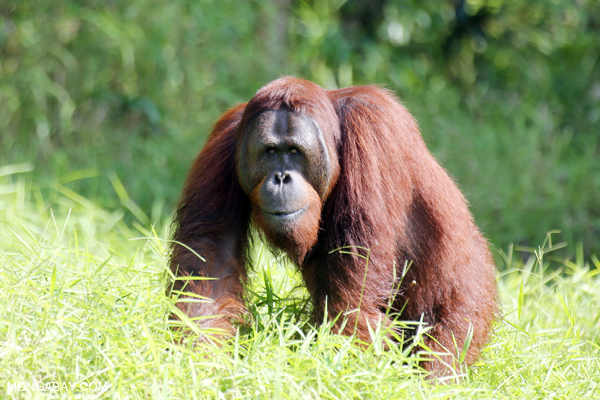 Environmentalists say greener palm oil is better for orangutans, whose habitat in Malaysia and Indonesia is being rapidly destroyed for oil palm plantation. Photos by Rhett A. Butler.
Environmentalists say greener palm oil is better for orangutans, whose habitat in Malaysia and Indonesia is being rapidly destroyed for oil palm plantation. Photos by Rhett A. Butler.
Two consumer products giants have joined the wave of companies committing to deforestation-free palm oil.
On Monday General Mills and Colgate-Palmolive both announced palm oil policies that go beyond standards set by the Roundtable on Sustainable Palm Oil (RSPO), the industry’s main certification body. The policies include provisions to protect wildlife-rich rainforests and carbon-dense peatlands, while respecting the rights of local communities.
The policies are similar to commitments made in recent weeks by Kellogg’s, Mars, and Orkla, although both have shortcomings according to environmental campaigners. Greenpeace says that Colgate-Palmolive’s 2020 target for implementing its policy should be moved up to 2015, while the Union of Concerned Scientists (UCS) says General Mills policy should use the “industry standard” definition of High Carbon Stock forests when determining whether palm oil is free from deforestation.
Nonetheless both groups welcomed the commitments and urged more companies to establish similar deforestation free policies for palm oil in order to show growers there is indeed a market for greener palm oil.
“It’s really up to major brands to turn the tide on the palm oil industry,” said Sharon Smith of the Union of Concerned Scientists, which recently released a scorecard ranking American companies on their palm oil sourcing policies. “If companies start demanding palm oil that’s deforestation-free, peatlands-free and exploitation-free, palm oil producers will start providing a better product. This better oil will also reduce emissions. It’s a win-win for consumers and the environment.”
“Indonesia’s forests are precious to all of us: they are the earth’s lungs, people’s homes, and habitat to countless animals including the endangered Sumatran tiger. But if we don’t stop forest destruction all of this will disappear,” said True Blood actress Kristin Bauer, who recently joined Greenpeace’s campaign to push for more forest-friendly palm oil. “More brands need to step up and follow Colgate’s lead.”

Deforestation in Malaysian Borneo for oil palm plantations.
Greenpeace added that the commitments put more pressure on Proctor & Gamble (P&G), a Colgate-Palmolive competitor that is currently the focus of an aggressive campaign by the activist group.
“With pledges from Unilever, Nestlé, L’Oréal and now Colgate-Palmolive to clean up their supply chains, P&G is choosing to lag behind its competition,” said Areeba Hamid, forest campaigner at Greenpeace International, in a statement. “There’s a huge difference between Colgate’s detailed policy and P&G’s empty commitment to the Roundtable on Sustainable Palm Oil’s weak certification scheme. It’s time P&G joined Colgate, Unilever, L’Oréal and Mars in guaranteeing its products are free from forest destruction.”
Palm oil production is the largest direct driver of deforestation in Malaysia and Indonesia, whose forests are home to endangered orangutans, tigers, rhinos, and elephants.
Related articles
Fast food companies are laggards on palm oil sourcing safeguards

(03/05/2014) Fast food companies are lagging behind other consumer products companies in efforts to establish policies that favor deforestation-free and conflict-free palm oil, finds a new assessment published by the Union of Concerned Scientists, an advocacy group. The report, titled ‘Donuts, Deodorant, Deforestation: Scoring America’s Top Brands on Their Palm Oil Commitments’, looked at palm oil sourcing policies of 30 of the largest fast food, personal care, and packaged food corporations in the United States. It found leadership by a handful of firms.
Greenpeace stunt targets Procter & Gamble’s Cincinnati headquarters over palm oil
(03/04/2014) Several Greenpeace activists were arrested after they scaled Procter & Gamble’s headquarters in a demonstration against the company’s use of palm oil linked to deforestation in Indonesia.
Procter & Gamble’s palm oil suppliers linked to deforestation (photos)

(02/26/2014) A year-long investigation by Greenpeace has found companies that supply Procter & Gamble (P&G) (NYSE:PG) with palm oil are engaged in clearing of rainforests and peatlands in Indonesia, suggesting that Head & Shoulders shampoo and other consumer products made by the company may be linked to forest destruction.
In pictures: Rainforests to palm oil

(07/02/2012) In late May I had the opportunity to fly from Kota Kinabalu in Malaysian Borneo to Imbak Canyon and back. These are some of my photos. Historically Borneo was covered by a range of habitats, including dense tropical rainforests, swampy peatlands, and natural grasslands. But its lowland forests have been aggressively logged for timber and then converted for oil palm plantations.














